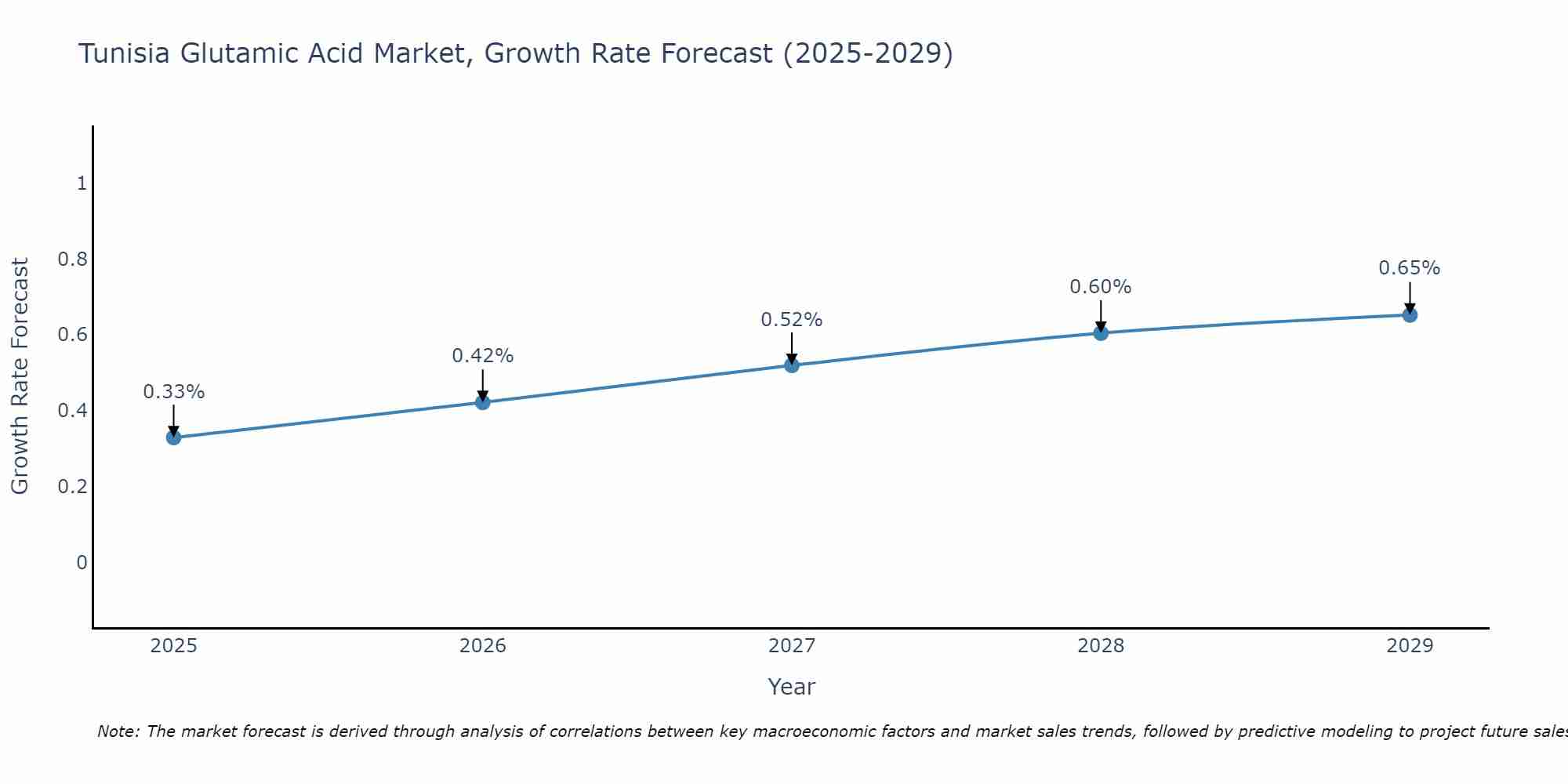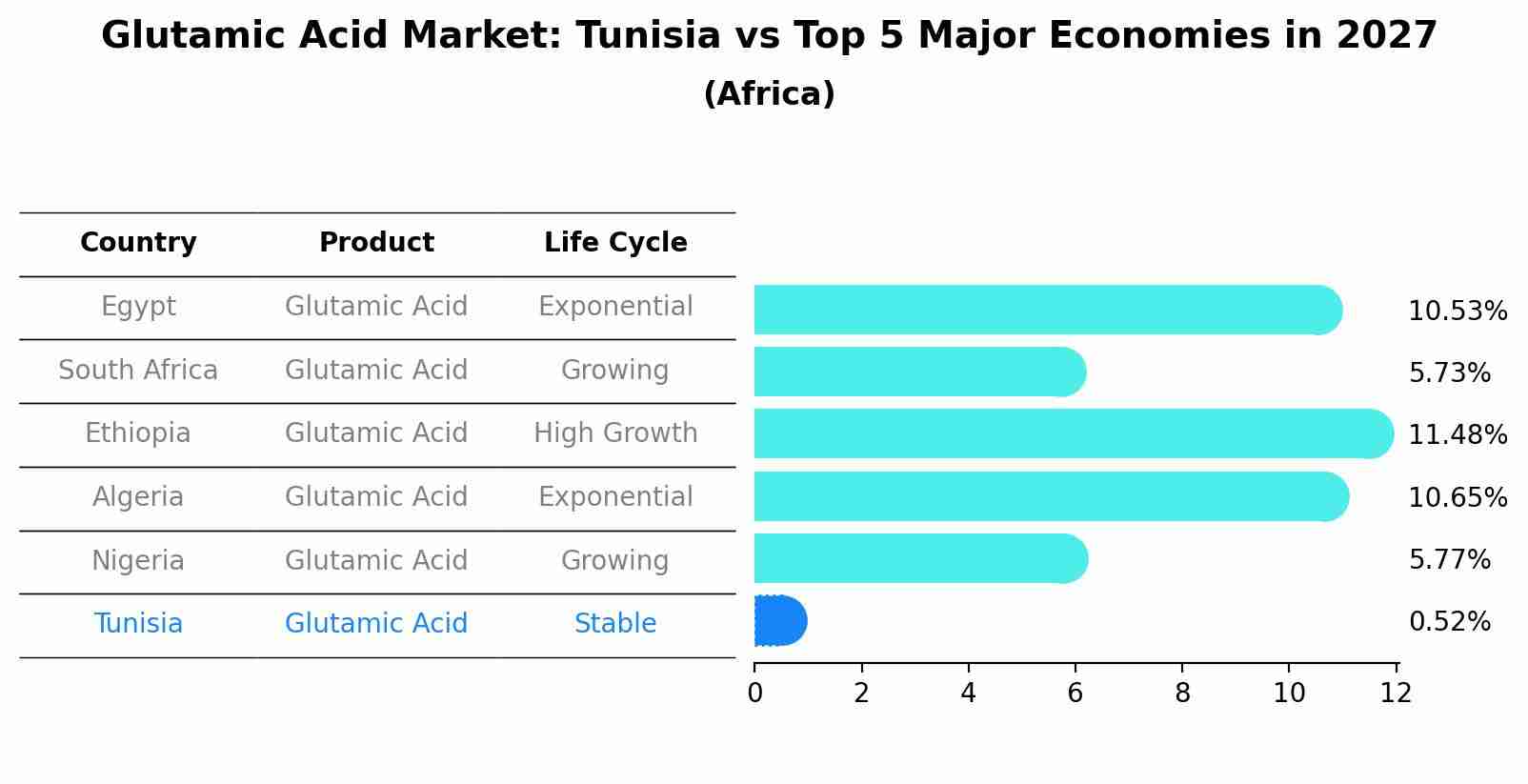Tunisia Glutamic Acid Market (2025-2031) Outlook | Industry, Value, Analysis, Share, Growth, Companies, Trends, Size, Forecast & Revenue
| Product Code: ETC326694 | Publication Date: Aug 2022 | Updated Date: Jul 2025 | Product Type: Market Research Report | |
| Publisher: 6Wresearch | Author: Shubham Padhi | No. of Pages: 75 | No. of Figures: 35 | No. of Tables: 20 |
Tunisia Glutamic Acid Market Size Growth Rate
The Tunisia Glutamic Acid Market is poised for steady growth rate improvements from 2025 to 2029. From 0.33% in 2025, the growth rate steadily ascends to 0.65% in 2029.

Glutamic Acid Market: Tunisia vs Top 5 Major Economies in 2027 (Africa)
By 2027, Tunisia's Glutamic Acid market is forecasted to achieve a stable growth rate of 0.52%, with Egypt leading the Africa region, followed by South Africa, Ethiopia, Algeria and Nigeria.

Tunisia Glutamic Acid Market Synopsis
The Tunisia Glutamic Acid market is experiencing steady growth driven by the increasing demand for food additives and flavor enhancers in the food and beverage industry. Glutamic acid is widely used as a flavor enhancer in various processed foods due to its ability to enhance the umami taste. The market is also benefiting from the expanding pharmaceutical and cosmetic industries in Tunisia, where glutamic acid is used in the production of drugs and skincare products. Additionally, the growing awareness among consumers regarding the health benefits of glutamic acid, such as improved digestion and immune system function, is further fueling market growth. Key players in the Tunisia Glutamic Acid market include manufacturers and suppliers catering to the diverse needs of the food, pharmaceutical, and cosmetic industries in the region.
Tunisia Glutamic Acid Market Trends
The Tunisia Glutamic Acid Market is experiencing steady growth due to the increasing demand from the food and beverage industry. Glutamic acid is widely used as a flavor enhancer in various food products, leading to its high consumption in the country. Additionally, the pharmaceutical industry is also driving the market growth as glutamic acid is used in the production of certain drugs. The market is witnessing a shift towards natural and clean label products, driving the demand for glutamic acid derived from natural sources. Manufacturers are focusing on product innovation and developing new applications for glutamic acid to cater to the evolving consumer preferences. Overall, the Tunisia Glutamic Acid Market is poised for continued growth in the coming years.
Tunisia Glutamic Acid Market Challenges
In the Tunisia Glutamic Acid market, challenges may include limited domestic production capacity leading to reliance on imports, fluctuating global prices affecting profitability, lack of awareness about the benefits of glutamic acid among consumers and manufacturers, competition from other food additive alternatives, and strict regulations governing food additives in Tunisia. Additionally, ensuring consistent quality and supply chain management could be potential challenges for players in the market. Addressing these challenges would require investments in production facilities, market education campaigns, strategic pricing strategies, and compliance with regulatory requirements to capitalize on the growing demand for glutamic acid in various industries in Tunisia.
Tunisia Glutamic Acid Market Investment Opportunities
The Tunisia Glutamic Acid Market presents various investment opportunities due to the growing demand for this amino acid in food and pharmaceutical industries. Investors can consider opportunities in manufacturing and supplying glutamic acid to meet the increasing demand from food processors, pharmaceutical companies, and animal feed manufacturers. Additionally, investing in research and development to enhance production processes and explore new applications for glutamic acid can be lucrative. Furthermore, potential partnerships with local businesses or international companies can help in expanding market reach and increasing profitability in the Tunisia Glutamic Acid Market. Overall, the market offers promising investment prospects for those looking to capitalize on the growing demand for this essential amino acid.
Jordan Agar Market Government Policies
The Tunisian government has implemented various policies to regulate the Glutamic Acid market, aiming to promote fair competition and ensure consumer protection. These policies include setting quality standards for Glutamic Acid production and distribution, monitoring pricing to prevent price manipulation, and implementing import/export regulations to control market supply. Additionally, the government has established licensing requirements for Glutamic Acid manufacturers to maintain product quality and safety standards. These policies are designed to create a transparent and efficient market environment, fostering growth and innovation within the Glutamic Acid industry in Tunisia.
Tunisia Glutamic Acid Market Future Outlook
The future outlook for the Tunisia Glutamic Acid Market appears promising, driven by increasing demand from food and beverage industries for flavor enhancers and the growing trend towards natural ingredients in the region. With the expanding food processing sector and rising consumer awareness regarding the benefits of glutamic acid in food products, there is a notable opportunity for market growth in Tunisia. Additionally, the pharmaceutical and animal feed industries are also expected to contribute to the market expansion. However, challenges such as price fluctuations of raw materials and regulatory constraints may impact market growth to some extent. Overall, the Tunisia Glutamic Acid Market is anticipated to witness steady growth in the coming years, supported by the increasing application of glutamic acid in various industries.
Key Highlights of the Report:
- Tunisia Glutamic Acid Market Outlook
- Market Size of Tunisia Glutamic Acid Market, 2024
- Forecast of Tunisia Glutamic Acid Market, 2031
- Historical Data and Forecast of Tunisia Glutamic Acid Revenues & Volume for the Period 2021 - 2031
- Tunisia Glutamic Acid Market Trend Evolution
- Tunisia Glutamic Acid Market Drivers and Challenges
- Tunisia Glutamic Acid Price Trends
- Tunisia Glutamic Acid Porter's Five Forces
- Tunisia Glutamic Acid Industry Life Cycle
- Historical Data and Forecast of Tunisia Glutamic Acid Market Revenues & Volume By End-Use Industry for the Period 2021 - 2031
- Historical Data and Forecast of Tunisia Glutamic Acid Market Revenues & Volume By Pharmaceutical for the Period 2021 - 2031
- Historical Data and Forecast of Tunisia Glutamic Acid Market Revenues & Volume By Cosmetic And Personal Care for the Period 2021 - 2031
- Historical Data and Forecast of Tunisia Glutamic Acid Market Revenues & Volume By Food Industry for the Period 2021 - 2031
- Historical Data and Forecast of Tunisia Glutamic Acid Market Revenues & Volume By Others for the Period 2021 - 2031
- Tunisia Glutamic Acid Import Export Trade Statistics
- Market Opportunity Assessment By End-Use Industry
- Tunisia Glutamic Acid Top Companies Market Share
- Tunisia Glutamic Acid Competitive Benchmarking By Technical and Operational Parameters
- Tunisia Glutamic Acid Company Profiles
- Tunisia Glutamic Acid Key Strategic Recommendations
Frequently Asked Questions About the Market Study (FAQs):
- Single User License$ 1,995
- Department License$ 2,400
- Site License$ 3,120
- Global License$ 3,795
Search
Thought Leadership and Analyst Meet
Our Clients
Related Reports
- Germany Breakfast Food Market (2026-2032) | Industry, Share, Growth, Size, Companies, Value, Analysis, Revenue, Trends, Forecast & Outlook
- Australia Briquette Market (2025-2031) | Growth, Size, Revenue, Forecast, Analysis, Trends, Value, Share, Industry & Companies
- Vietnam System Integrator Market (2025-2031) | Size, Companies, Analysis, Industry, Value, Forecast, Growth, Trends, Revenue & Share
- ASEAN and Thailand Brain Health Supplements Market (2025-2031) | Strategy, Consumer Insights, Analysis, Investment Trends, Opportunities, Growth, Size, Share, Industry, Revenue, Segments, Value, Segmentation, Supply, Forecast, Restraints, Outlook, Competition, Drivers, Trends, Demand, Pricing Analysis, Competitive, Strategic Insights, Companies, Challenges
- ASEAN Bearings Market (2025-2031) | Strategy, Consumer Insights, Analysis, Investment Trends, Opportunities, Growth, Size, Share, Industry, Revenue, Segments, Value, Segmentation, Supply, Forecast, Restraints, Outlook, Competition, Drivers, Trends, Demand, Pricing Analysis, Competitive, Strategic Insights, Companies, Challenges
- Europe Flooring Market (2025-2031) | Outlook, Share, Industry, Trends, Forecast, Companies, Revenue, Size, Analysis, Growth & Value
- Saudi Arabia Manlift Market (2025-2031) | Outlook, Size, Growth, Trends, Companies, Industry, Revenue, Value, Share, Forecast & Analysis
- Uganda Excavator, Crane, and Wheel Loaders Market (2025-2031) | Strategy, Consumer Insights, Analysis, Investment Trends, Opportunities, Growth, Size, Share, Industry, Revenue, Segments, Value, Segmentation, Supply, Forecast, Restraints, Outlook, Competition, Drivers, Trends, Demand, Pricing Analysis, Competitive, Strategic Insights, Companies, Challenges
- Rwanda Excavator, Crane, and Wheel Loaders Market (2025-2031) | Strategy, Consumer Insights, Analysis, Investment Trends, Opportunities, Growth, Size, Share, Industry, Revenue, Segments, Value, Segmentation, Supply, Forecast, Restraints, Outlook, Competition, Drivers, Trends, Demand, Pricing Analysis, Competitive, Strategic Insights, Companies, Challenges
- Kenya Excavator, Crane, and Wheel Loaders Market (2025-2031) | Strategy, Consumer Insights, Analysis, Investment Trends, Opportunities, Growth, Size, Share, Industry, Revenue, Segments, Value, Segmentation, Supply, Forecast, Restraints, Outlook, Competition, Drivers, Trends, Demand, Pricing Analysis, Competitive, Strategic Insights, Companies, Challenges
Industry Events and Analyst Meet
Whitepaper
- Middle East & Africa Commercial Security Market Click here to view more.
- Middle East & Africa Fire Safety Systems & Equipment Market Click here to view more.
- GCC Drone Market Click here to view more.
- Middle East Lighting Fixture Market Click here to view more.
- GCC Physical & Perimeter Security Market Click here to view more.
6WResearch In News
- Doha a strategic location for EV manufacturing hub: IPA Qatar
- Demand for luxury TVs surging in the GCC, says Samsung
- Empowering Growth: The Thriving Journey of Bangladesh’s Cable Industry
- Demand for luxury TVs surging in the GCC, says Samsung
- Video call with a traditional healer? Once unthinkable, it’s now common in South Africa
- Intelligent Buildings To Smooth GCC’s Path To Net Zero


















